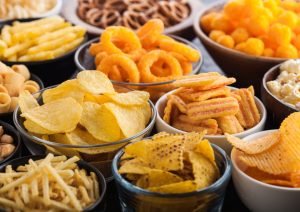Improving Brain Health Through Nutrition
Nutrition is essential for brain health. Eating well for memory, focus, and the best cognitive function is a good plan when studying for exams.
So too, is focusing on what will feed the good bugs in your gut, aiding brain health.
Not eating good brain food, not exercising, or sleeping enough while preparing for exams may upset your gut health, which may upset your brain health.
This post is designed to help anyone who wants to improve their focus, memory, and cognitive thinking, which is particularly helpful for exam time and anytime!
What Is Good Brain Health?
What Are the Best Brain Foods?
What Foods Are Good for Memory and Focus?
What Helps Studying?
How Can You Improve Focus and Concentration?
How Do You Stop Craving Sweets and Snacks?

What Is Good Brain Health?
In the British Medical Journal, the brain is defined as a complex organ with at least three levels of functions that affect our daily lives.
These are:
- Maintenance of cognitive, mental, and emotional processes
- Maintenance of normal behavior and social cognition
- Interpretation of senses and control of movement
Brain health, therefore, may be defined as the preservation of optimal brain integrity and mental and cognitive function and the absence of neurological disorders. Wang et al. BMJ (2020).
Neurological disorders are linked to systemic inflammation affecting the central nervous system.
For thousands of years, it has been known that nutrients can affect cognitive processes.
Along with other factors like exercise and sleep, nutrition plays a crucial role in shaping cognitive functions. The network of neurons that communicate with cells and the body relies on nutritious, anti-inflammatory, gut-healthy foods that will prevent oxidative stress, fight free radicals, and encourage neurotransmitter production, for instance.

Many foods contribute to cognitive decline.
Foods that increase inflammation will increase inflammation in the brain, too.
Take, for instance, ultra-processed foods (UPFs), which I talk about a lot. If they form the majority of someone’s diet, then essential brain nutrient requirements are not being met. For instance:
- Short-chain fatty acids support the integrity of the blood-brain barrier, protecting the brain from toxic compounds.
- Polyphenols offer protection from neurodegenerative diseases (and cancer, cardiovascular diseases, osteoporosis, etc.).
- Omega-3s, which are important for our brain throughout our lives…and the list goes on!
You may enjoy reading: Do We All Need Omega-3?

What Foods Are Good for Memory and Focus?
Any foods that encourage bad bugs to flourish in your tummy causing gut dysbiosis (imbalance), are not good for memory, learning, and focus.
When you eat nourishing, nutritional food, which promotes a healthy gut and ‘feel-good’ neurotransmitter synthesis, it also reduces inflammation in the brain and supports healthy brain function.
Neurotransmitters are an integral part of the brain-gut axis. You can read all about the amazing things neurotransmitters do for our minds and bodies here.
Dopamine, for instance, is involved in memory and focus. 50% is produced in the gut by enteric neurons and intestinal epithelial cells. The rest is made in the brain by converting the amino acid tyrosine into another amino acid called L-dopa! L-dopa then undergoes another change, where enzymes turn it into dopamine!
The role of dopamine is also involved in attention, learning, cognition, mood, and motivation. These are all important, of course, and will assist you when you are studying for exams.

Tyrosine, for example, plays a critical role in dopamine production. Boosting levels with tyrosine-rich foods are a good way. It can also be made from phenylalanine, another amino acid in many protein-rich foods we love on EBS!
These provide an extra boost of memory and mental performance!
Like other minerals and vitamins, for instance, concentrating on tyrosine alone won’t work if your body lacks good nutrition.
Also, just taking ‘studying’ supplements are not enough, either. If you missed it, read my AGI Review: Is AGI Supplement Good for You?
Needless to say, you always need complete nutrients to allow for conversions and synthesis in the body.

What Helps Studying?
Nourishing your gut and mind will also help you keep stress at bay and reduce any digestive issues and anxiety you may have while studying. Did you read last week’s article: How Do You Live With IBS and Anxiety?
Various compounds and activities enhance brain health and help with studying for exams. They make an immense difference in learning and retaining information! Plus, you are protecting yourself from possible neurodegenerative disease, looking further down the line.
So many diets contribute to difficulties with studying, staying focused, and remembering. Snacking and not eating and drinking well during exam time is common. Just bear the thought that if you eat, drink, and sleep well, it is likely to enhance your studying at this time.
Make sure you read: What Happens If You Don’t Sleep Well? , Why Are You Moody and Irritable? , and
Is This the Reason Why You Are Tired All the Time?

How Can You Improve Focus and Concentration?
Focus and concentration can improve rather quickly when you switch to an anti-inflammatory diet and lifestyle. It isn’t just about food!
Replenishing, nourishing brain health nutrients will kick in rather quickly. Following Eat Burn Sleep for brain food for studying, cravings for ultra-processed foods (UPFs) will diminish. This is good because UPFs won’t help your focus, memory, and cognitive thinking.
If you think that you are doing okay eating them, imagine how even greater your mind can be. Do bear in mind long-term use because oftentimes, we can get away with things if they are temporary.
Changing diet patterns isn’t as hard as it may seem, too. It’s all about those bugs in our tummies!

How Do You Stop Craving Sweets and Snacks?
You can stop craving sweets and snacks on Eat Burn Sleep.
Members say that foods they used to eat now taste so ‘weird,’ ‘strange,’ and ‘chemical,’ and they cannot believe that they used to form a large part of their diet.
Focusing on improving the bacteria in your stomach is so powerful because it removes those ‘addictive’ bacteria that keep telling your brain that you want more junk. Bacteria are so powerful. They, good or bad, tell your brain to feed them more of what they need to survive.
So, the harmful bacteria that cries out for unhealthy food wants to grow and multiply. If they are satisfied, the good guys will diminish. As this is happening, your body can become susceptible to digestive and immune issues and chronic inflammatory conditions. Your brain may not be at its optimum, slowing your cognitive function. This will mean that studying, memory, focus, and all learning abilities may not be not as switched on as they could be.
Looking after your brain and nervous system will look after automatic activities such as breathing and waking up. It will also aid in reading, learning, and remembering information.
Ensure that you eat well and live well. Support the vagus nerve, move correctly, keep stress and inflammation at bay, look after your immune system, and support neurotransmitter production by doing so. It will assist in your studying.
Having the right balance will ensure good quality sleep. It’s important not to fight sleep for good cognitive function.
Being kind to yourself is essential. During exams. During life.
I wish you good health and good luck.


